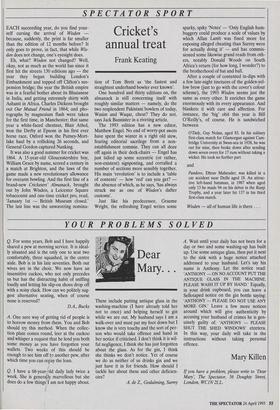SPECTATOR SPORT
Cricket's annual treat
Frank Keating
EACH succeeding year, do you find your- self cursing the arrival of Wisden because, suddenly, the print is far smaller than the edition of 12 months before? It only goes to prove, in fact, that while Wis- den does not change, one's eyesight does.
Eh, what? Wisden not changed? Well, okay, not as much as the world has since it first hit the streets 130 editions ago — the year they began building London's Embankment and topped off Clifton's sus- pension bridge; the year the British empire was in a fearful bother about its Bhutanese in India, and getting extremely shirty with Ashanti in Africa. Charles Dickens brought out Our Mutual Friend in 1864; and pho- tographs by magnesium flash were taken for the first time, in Manchester; that same year a white-faced chestnut, Blair Athol, won the Derby at Epsom in his first ever horse race, Oxford won the Putney-Mort- lake haul by a rollicking 26 seconds, and General Gordon captured Nanking.
It was also a good summer for cricket was 1864. A 15-year-old Gloucestershire boy, William Grace by name, scored a century in a match at Brighton, and the laws of the game made a new revolutionary allowance for overarm bowling. And the first line of a brand-new Cricketers' Almanack, brought out by John Wisden, a Leicester Square tobacconist and one-time cricket pro, read, `January 1st — British Museum closed.' The last line was the unwavering nomina- tion of Tom Brett as 'the fastest and straightest underhand bowler ever known'.
One hundred and thirty editions on, the almanack is still concerning itself with roughly similar matters — namely, do the two resplendent Pakistani bowlers of today, Wasim and Waqar, cheat? They do not, says Jack Bannister in a riveting article.
The 1993 edition has a new editor, Matthew Engel. No end of worry-pot swots have spent the winter in a right old stew, fearing editorial sacrilege from a non- establishment commie. They can all doze off again in their deck-chairs — Engel has just tidied up some eccentric (or rather, non-existent) signposting, and corralled a number of sections more sensibly together. His main 'revolution' is to include a 'table of contents' — how 'red' can you get? the absence of which, as he says, 'has always struck me as one of Wisden's dafter customs'.
Just like his predecessor, Graeme Wright, the refreshing Engel writes some sparky, spiky 'Notes' — 'Only English hum- buggery could produce a scale of values by which Allan Lamb was fined more for exposing alleged cheating than Surrey were for actually doing it' — and has commis- sioned some likewise grand reads from oth- ers, notably Donald Woods on South Africa's return (for how long, I wonder?) to the brotherhood of bat and ball.
After a couple of contented in-dips with a few late-night tinctures of the golden-yel- low brew (just to go with the cover's colour scheme), the 1993 Warden seems just the same as every other. It enriches the game enormously with its every appearance. And blankets it with care and affection. For instance, the 'big' obit this year is Bill O'Reilly's, of course. He is sandwiched between O'Da, Guy Nolan, aged 83. In his solitary first-class match for Glamorgan against Cam- bridge University at Swan-sea in 1938, he was out for nine, then broke down after sending down seven overs for 17 runs without taking a wicket. He took no further part and Pandove, Dhruv Mahender, was killed in a car accident near Delhi aged 18. An attrac- tive left-hand batsman, in 1987 when aged only 13 he made 94 on his debut in the Ranji Trophy, and a year later hit 137 in his third first-class match.
Wisden — all of human life is there . . .


























































 Previous page
Previous page